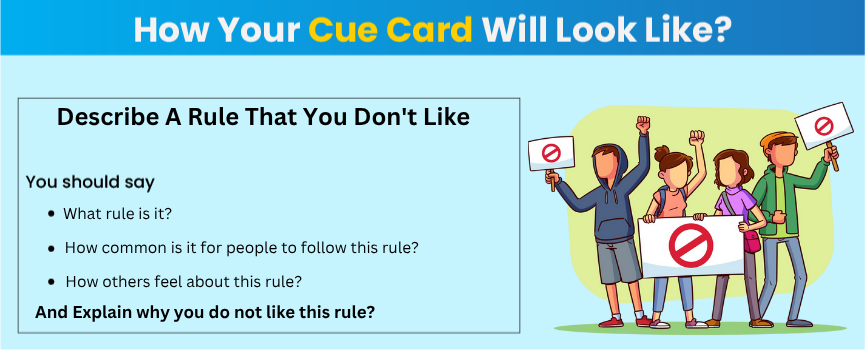Describe A Rule That You Don't Like- IELTS Cue Card
Last updated: Jul 24, 2025In the IELTS speaking part 2, you can get topics from a wide range of subjects like personal experiences, objects, places, events, and general interests. One of these cue card topics can be “Describe A Rule That You Don't Like”, where you will have to discuss a specific rule that you do not like based on a few pointers. But since you only get a minute for preparation, it can get hard to organise your thoughts. To help you with this, below you will find three sample answers along with a few tips and follow-up questions. Read on!

Table of Contents
Introduction to IELTS Cue Cards
In the second part of the IELTS speaking section, you will be given a cue card or "long turn" topic on which you will have to talk for 1-2 minutes. In total, you will get three minutes, where one minute is for you to understand the topic and prepare your response.
The main aim of IELTS cue cards is to assess how well you can organise your thoughts, speak fluently, and use appropriate vocabulary for IELTS on any given subject. Your response will then be evaluated on different metrics like fluency and coherence, lexical resource (vocabulary), grammatical range and accuracy, and pronunciation.
In the topic “Describe A Rule That You Don't Like”, you will have to talk about any specific rule that you do not like, and explain what it is, why you dislike it, and how others perceive it. This topic will help you show your ability to express opinions, use descriptive language, and structure a coherent speech.
How to Answer the Cue Card?
The best way to answer the IELTS cue card is by understanding the topic and staying focused on it. Another great way is to jot down the key points that you can use in your response. Below are some more ways that you can keep in mind to answer the IELTS speaking part 2 effectively and get your desired band score:
- Read Carefully: Once the examiner gives you the card, take a moment to read the topic carefully and try to understand what you are expected to include in your response.
- Plan Your Response: During the one-minute preparation time, you should also try to brainstorm ideas, or create a brief outline. You can also try to organise your thoughts into an intro, body, and conclusion.
- Stay on Topic: Lastly, avoid diverging from the topic or including a point that is not quite related to it.
In addition to this, in the cue card, you will also get a few pointers that you will have to use in your response. These pointers are there to guide you and can help you in formulating your answer in a precise and cohesive way.
For the topic “Describe A Rule That You Don't Like”, you can get these pointers:
- What rule is it
- How common is it for people to follow this rule
- How others feel about this rule
- And explain why you do not like this rule.
Here is an example of how your IELTS cue card for this topic might look:

Now, let’s take a look at three samples for the cue card topic “Describe A Rule That You Don't Like” that will help you get a band score of 7+ in your IELTS speaking section. Read below!
Describe A Rule That You Don't Like - Sample 1
This first sample will give you a basic idea of how you can formulate your cue card response based on the given pointers for the IELTS speaking part 2. Take a look:
Introduction
Even though most of the rules and expectations are written officially, there are some rules or social norms that exist without anyone even speaking. And this is something that I do not like, as they build up expectations for someone who might not even want to be a part of it.
What rule is it?
And one of these rules is the traditional belief that women must cook and handle kitchen responsibilities. This is something which is followed by almost every culture, including mine. Even in cases when both men and women have a full-time job, it is generally expected of the woman to come home and cook while the man relaxes. Even though it is not specifically written anywhere, it is deeply rooted in many households.
How common is it for people to follow this rule?
Unfortunately, this mindset is still quite common and is followed by a lot of people, especially in more traditional or rural families. However, the younger generations are starting to move away from it, but it is still followed without question. It is also sometimes because of cultural pressure or because that’s what most people saw growing up.
How do others feel about this rule?
I think the opinions around this unspoken rule are slowly changing. There are many women, especially younger ones, who feel that this is an unfair expectation and are speaking out against it. But there are some people, both men and women, who still support the idea. There are also some instances when women feel guilty for not cooking because of how they were raised.
Explain why you do not like this rule.
I dislike this rule because I believe that household responsibilities need to be shared equally, no matter what your gender is. Cooking is a basic life skill and not something that you can tie to a specific gender. This is an unnecessary expectation that limits the freedom of women and also reinforces outdated gender roles. This can end up affecting how children grow up viewing equality in relationships.
Conclusion
So, for me, the idea that women are the ones who have to cook is not only unfair but also outdated. In a modern, equal society, both men and women should feel free to share responsibilities in not just the kitchen but also beyond.


Describe A Rule That You Don't Like - Sample 2
In this sample, we have used a wide range of vocabulary words to describe a rule one might not like. Because of the higher range of vocabulary, you can easily get a better score in the lexical resources:
Introduction
So many universities have specific rules when it comes to regulating a student’s course choices. While these rules are really important to ensure academic focus, some rules unnecessarily limit a student’s options.
What rule is it?
This one particular rule that I do not like is restricting students from taking courses outside their major unless they are recommended by the university’s authorities. For example, if a student wants to study a subject that is not related to their field, then they need to have prior approval.
How common is it for people to follow this rule?
This particular rule is strictly followed by most universities in my country, and especially in public institutions. Most of the students I know, and even I, had stuck to it because the registration system won’t let them sign up for courses without approval.
How do others feel about this rule?
I think most people have different opinions when it comes to this rule, but most of the students feel restricted. They also feel a bit frustrated because this rule does not give them the freedom to explore different subjects and interests beyond their major.
Explain why you do not like this rule.
Personally speaking, I do not like this rule because I feel education is about broadening one’s knowledge and exploring new ideas. These rules just restrict and stop students from being creative and having intellectual growth. For example, a business student might want to learn some psychology or art, which helps a great deal in improving their perspective, but this rule makes it difficult.
Conclusion
Now, I understand that universities have a valid reason for enforcing this rule, but I just feel that it is very unfair. Allowing students to take more courses outside their majors can encourage a more well-rounded education and better prepare them for the real world.

 Access speaking Mock Test
Access speaking Mock Test Describe A Rule That You Don't Like - Sample 3
In this last sample, we have given a model answer for getting a band 8+ in the IELTS speaking section. You can take this as a reference and try to follow the same structure, fluency, and vocabulary in your response:
Introduction
Generally, rules are made to promote fairness or support certain groups, but sometimes these rules can end up being a little unfair to others. And one such rule that I feel is unfair to others is the reservation of seats for specific groups in education and government jobs.
What rule is it?
In my country, there is a certain number of seats in universities and jobs are reserved for groups from underprivileged or socially disadvantaged categories. These groups are given preferential treatment regardless of their merit.
How common is it for people to follow this rule
This rule is strictly implemented across almost all public institutions. Every year, some seats are allocated based on quotas, and most of these public institutions are required by law to follow this policy. Students applying through the general category are very familiar with this, especially during competitive exams or university admissions.
How others feel about this rule
People are divided when it comes to this rule. While some believe it is really important to uplift the socially disadvantaged class, others believe that it is unfair and promotes inequality. There is no doubt that there is a need for uplifting such groups, as they have suffered a great deal when it comes to equality, but not giving deserving candidates what they work hard for is unfair. This rule, in turn, ends up causing resentment among students who work very hard but are unable to secure a seat due to fewer available positions in the general quota.
Explain why you do not like this rule.
I do not like this rule because it doesn’t always consider economic background or individual merit. A student from a reserved category with fewer qualifications might get a seat, while a general category student with higher scores might be left out. I believe that help should be based more on financial need and academic effort rather than caste or background alone. This would ensure that the truly underprivileged receive support, and the system remains fair to everyone.
Conclusion
I think while the intention behind the reservation is noble and well thought out, the current system needs to be reformed. Merit and need-based support would create a more balanced and just environment, especially in education and employment.
Master the IELTS exam with our Prep Boost
What’s included:
- Pre-recorded video lectures
- Advance Study Materials
- Detailed Feedback Report
Lexical Resources
In the IELTS speaking section, you also get scores for lexical resources, which account for 25% your total score in both sections. Lexical resources refer to the range of your vocabulary and how you use it in your response effectively.
In the table below, we have listed all the words that we used in our sample responses above:
| Word | Definition |
|---|---|
| Expectation | A belief about what will or should happen. |
| Officially | In a formal or authorized manner. |
| Norms | Accepted standards or ways of behaving in a group. |
| Rooted | Firmly established or deeply ingrained. |
| Unspoken | Not expressed in words but understood or implied. |
| Instances | Specific examples or occurrences of something. |
| Outdated | No longer current or in use; old-fashioned. |
| Regulating | Controlling or maintaining something by rules or laws. |
| Restricted | Limited in access, movement, or amount. |
| Broadening | Expanding or increasing in range or scope. |
| Intellectual | Relating to the use of reasoning or thinking. |
| Prospective | Expected or likely to happen in the future. |
| Encourage | To give support or confidence to someone. |
| Underprivileged | Lacking basic needs or opportunities compared to others. |
| Preferential | Giving an advantage to one group over others. |
| Implemented | Put into effect or action. |
| Allocated | Set aside or distributed for a particular purpose. |
| Inequality | Lack of fairness or equal treatment. |
| Resentment | Bitter anger caused by feeling unfairly treated. |
| Economic Background | A person's financial and social circumstances. |
| Merit | Worthiness based on ability or achievement. |
| Qualifications | Credentials or skills required for a job or activity. |
| Ensure | To make certain that something happens. |
| Noble | Showing high moral qualities or ideals. |
Follow-up Questions
Once you are done with your cue card response, you will be asked a series of general follow-up questions regarding the topic or based on your response. Through this, the examiner will try to assess your ability to expand ideas and how well you can express your opinion with clarity.
Below are some follow-up questions that the examiner can ask you for the topic “Describe A Rule That You Don't Like.” Read below:
1. Is it a good thing to break rules sometimes?
Yes, it can be a good thing to break rules sometimes, especially if the rules are outdated or promote inequality. For example, when it comes to gender roles around cooking, I believe it is a good thing to break these unspoken rules, as it can help us set a better example for the generation to come.
2. What are the negative consequences of this rule?
The main negative consequences of this rule are that it limits students from learning and exploring different interests. Because of this, students end up having a narrow perspective and reduced creativity.
3. How could the rule be improved to be fairer or effective?
One simple way we can improve a rule like caste-based reservation is by redesigning it and taking into account other factors as well. Instead of just caste, we can also try to help students from low-income households as well. This way, we can help those who truly need support regardless of their background.
4. What would you change about this rule if you had the power to do so?
If I had the power to do so, I would take a flexible elective system. In which students can choose at least two or three subjects outside of the main field every semester. This can help in a well-rounded education.
5. Do you think rules should always be strictly enforced, or is there room for flexibility?
I believe this mainly depends on the rule. In some cases, like social norms, we can be more flexible and open to change because enforcing traditional expectations can only slow progress.
Tips to Excel in IELTS Cue Card
Lastly, we have listed some tips that can help you get your desired band score and ace the IELTS speaking part 2. These are a few general topics, along with strategies that can help you improve your lexical resources.
- Choose a relevant rule: Make sure that you choose a rule that you have a good knowledge of, as this can help you avoid fumbling and losing time thinking.
- Use specific examples and details: You can also try to use examples to better explain your thoughts and make your response more engaging.
- Employ appropriate vocabulary: To improve your scores in lexical resources, you can try to use related terms for “rules” like compliance.
- Structure your answer: Start your answer by introducing the rule and then elaborating on your reasons, and lastly, end it with a concluding statement.
- Idioms and Phrasal Verbs: Try to use idioms and phrasal verbs in your response to show your language skills.
- Collocations: Lastly, you can use words that naturally go together. For example, you can say "guilty of committing a crime" instead of "making a crime"
Conclusion
In conclusion, you can easily ace topics like “Describe A Rule That You Don't Like” with proper preparation and practice and by using on samples and tips above. In addition to this, you can also take help from our online IELTS Classes that are designed to give you tailored help. Here, you will also get structured guidance, targeted practice, and expert feedback on speaking skills.
0 comments

Practice Makes a Man Perfect!Take FREE ielts Mock Tests
Start FREE Mock TestPredict your IELTS Band

98% students got exact IELTS Band
What is your Target IELTS Band?
Get familiar with the Real IELTS Exam for Free!
Start Free Mock TestWe are available in :
BangaloreAhmedabadJaipurHyderabadKeralaPuneChandigarhMumbaiGurgaonChennaiKolkataTrivandrumNoidaKochiCalicutKottayamKollamThrissurIndoreUdaipurdisclaimer:logos and other registered trademarks of universities used on this platform are held by their respective owners. Gradding does not claim ownership or association on them, and their use is purely for informational and illustrative purposes.















